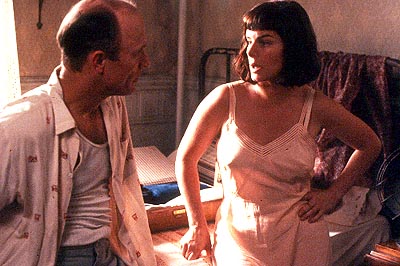

So often these days biographical movies bog themselves down either in minutiae or over-analyzation. The life of the subject as a whole is lost. Which is why sometimes a simple look at the life of a historical figure is enjoyable and enough. It's also good when the film as well made as it is here, in Pollack. Pollack, a labor of love by Ed Harris (Enemy at the Gates, The Third Miracle), does not try to look into Jackson Pollack's psyche or to see why he was the way he was, it just intends to tell the story of a unique man. Pollack's work is an important part of the modern art movement, a compelling mixture of strings and splashes that looks amazing to some and ridiculous to others. The fact that the film garnered two surprise Oscar nominations (although the one for Harris was well-deserved) will also give it an extremely high profile as it moves into wider release.
Harris' performance is the cornerstone of Pollack. He also directed and the film, adapted by Susan Emshwiller (Dogtown) and Barbara Turner (Beautiful View) from Jackson Pollack: An American Saga by Steven Naifeh and Gregory White Smith. To prepare for the role, he built a studio and practiced painting in Pollack's style. The result is him painting in the film, not some close-up of a hand and nothing else, or a shot of everything except his hands. The scenes where he paints are exhilarating. Harris loses himself into the role. The painting is all that matters; the world around him is unimportant and disappears. The art that Harris creates looks realistic. When he's not painting, Harris as Pollack remains unreadable. He has a vacant stare in his eyes, and even mastered the crooked cigarette hanging from the corner of his mouth. One fantastic element present here and not in other movies about actual artists are actual paintings. Harris obtained permission to use reproductions of Pollack's paintings in the film, which furthers the illusion of reality.
Pollack traces Pollack's rise from obscure artist to painting phenom, and his later downward spiral that eventually led to his death. Through all this, the one constant in his life was wife (and artist) Lee Krasner (Marcia Gay Hayden, Space Cowboys, Meet Joe Black). Harris portrays Krasner as Pollack's anchor. She was the one who helped him along the path to stardom, keeping him grounded in reality and on the straight and narrow. Hayden gives a strong performance, but Harris takes most of the spotlight. The rest of the story is a little on the light side. It would have been nice to see some more interaction between Pollack and his friends and critics, or a little more on his life, but watching Harris paint more than makes up for any deficiency.